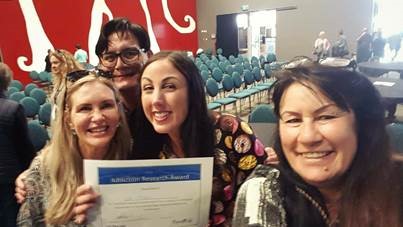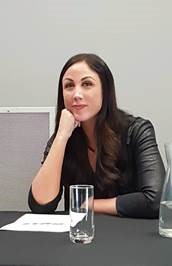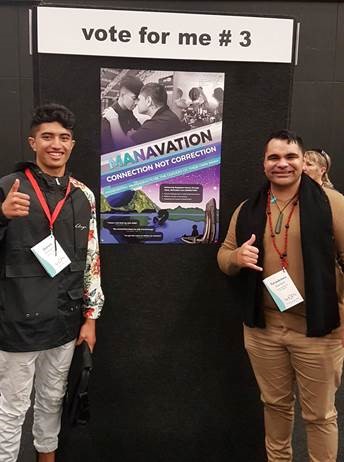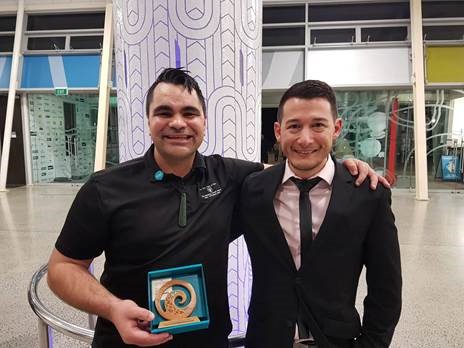Dapaanz (Drug & Alcohol Practitioners’ Association Aotearoa-New Zealand) is the professional association for people working in addiction treatment. Last week, they held their annual conference, Cutting Edge 2018, in Rotorua, with the theme “It’s all about Connection”.
Amongst attendees were our very own Turaukawa Bartlett and Lisa Phillips, who just happened to pick up a few awards at the conference.
We interviewed the two to find out about their awards and how the conference went.
Congratulations Lisa Phillips – Winner Matua Raki New & Emerging Researcher Award
 Lisa, congratulations on winning the Matua Raki New & Emerging Researcher Award, fantastic. Tell us a little about your abstract, ‘The People we Become’.
Lisa, congratulations on winning the Matua Raki New & Emerging Researcher Award, fantastic. Tell us a little about your abstract, ‘The People we Become’.
We need a strong and well supported workforce to ensure that the people we love, who may experience substance use issues, get the best possible support when they access services. The People we Become is a research piece that explores how addiction practitioners are impacted in terms of their own wellbeing as a result of the work they do. This sample was selected to be a smaller data set for verification through a Doctoral thesis. The research reflected that addiction practitioners, throughout their careers, are impacted in a variety of ways. A large percentage of the sample experience a deterioration in their mental health between their second and third years of practice, which may help identify why so many practitioners resign during this crucial period of their practice. A number of other findings were gathered, with interventions designed for each stage of practice.
Now, in addition Lisa, a little birdie tells me that you’ve recently submitted your Master’s thesis for marking, completed whilst working full time. Congratulations. Tell us a little about your Masters journey.
I enrolled a Master’s thesis program to allow my research findings a platform for further consideration. Often, research that isn’t backed by a learning institution doesn’t gather the momentum that it deserves. As a beginning researcher, I was aware that I needed the backing of my supervisors to gather the support to implement the research findings. Next steps academically are using this sample to justify the need for further research which would provide targeted workforce supports throughout addiction and mental health services. This matters to me personally, as when I think of whānau who want support, I want that support to be of a standard that respects the effort a person has made to ask for help. We need top notch services in New Zealand, and this academic journey is my way of contributing to that.
 Lisa, you’re clearly very passionate about this space. Tell us a little bit about how you happened to end up working in this space, and your career journey to where you are now.
Lisa, you’re clearly very passionate about this space. Tell us a little bit about how you happened to end up working in this space, and your career journey to where you are now.
I ended up working in addictions after realising that many of the students I was working with were missing out on their education as a result of their health issues (addictions). These were clearly intelligent students, and the training I received at teachers college did not equip me to best support these teenage and adult learners. Punitive measures are ineffective when working with substance use, so I needed to learn another way. I got my practitioners registration during my time as clinical team leader of 3 residential and social addiction treatment services.
How was the conference, any key messages/take-outs you want to share with your Careerforce whānau?
The conference was the best addictions conference I have been to. Attendees were encouraged to be bold when sharing their own struggles with addiction, which would serve to normalise these issues, as well as reflecting that addiction does not discriminate. We can be employed, hold down a full time job with a family, and still have issues with addiction. The key for me is that we talk about these challenges, and the more we do, the less those of us who are in recovery, or working towards recovery, will feel isolated and unable to connect. We have a responsibility to support each other through this, and this is reflected in our own Careerforce values. My hope would be that staff at Careerforce could access any supports they may need, without fear of reprimand or discrimination. Addiction is a health issue, and needs to be treated as such.
Congratulations Turaukawa Bartlett – Winner Best Newcomer to the Sector Award
Turaukawa, congratulations on winning the Dapaanz ‘Best Newcomer to the Sector’ Award for 2018, a fantastic achievement. Your abstract was MANAVATION® – Connections not corrections. Tell us a little about this?

Turaukawa with Darion Williams of Paeroa College
The MANAvation abstract tells a story of how we (my wife Aimee Bartlett – registered AOD Clinician, and myself) have developed a school-whānau-community-wide approach to supporting rangatahi experiencing mental health and addiction issues within a framework of mātauranga (knowledge) Māori. This framework details our journey of walking in four worlds – te ao Māori; te ao Pākehā; te ao clinical and te ao kaiāwhina to provide a holistic-centred infrastructure of hauora support. This approach was developed in direct response to the mainstream, Euro-centric approaches that have been failing Māori in our current health system. The approach enhances the young person’s sense of connectedness to others, and looks to enhance cultural identity and relational wellbeing as protective factors against drug-related harm.
The abstract explores how we have re-defined best practice, and shifted the paradigm of care to include tikanga (such as karakia, whakapapa and kawa) as clinical interventions in their own right – deconstructing the discourse that Māori frameworks and/or approaches are ‘alternative/secondary models’ to the medical model.
How was the conference, any key messages/take-outs you want to share with your Careerforce whānau?
For my whānau, the conference was a great opportunity for kōrero tapu (sacred and personal conversations) to occur with a high majority of Māori attending. Our presentation created an environment where Māori felt comfortable to challenge the current approaches, as well as ourselves, in how we perhaps have assimilated to an environment which is incongruent to the skills and knowledge that we inherit through whakapapa as Māori. The highlight though, has to be delivering the presentation alongside a rangatahi from the programme who put a face and voice to the vision; walking the talk and showing theory in practice. This young man was fearless, and did not hold back in challenging the audience – asking ‘what are you actually doing for our community to support your future leaders?’.
How does this relate to your work with Careerforce – te toi pūkenga?

Turaukawa with Ben Birks Chair of dapaanz
We know that regardless of the context, we’re all in the same waka – enhancing the hauora of Aotearoa.
What this specific approach tells us is that like our rangatahi, we need to put trainees at the centre of care; understanding that they are people first, then trainees. And just like everyone, we all yearn for a sense of connection and whanaungatanga – one that ultimately supports our determination in achieving hauora, and subsequently, training achievement.
There is a significant change in the way that Māori are achieving – I’m living proof. No longer is it about a person’s academic ability or talent, but more so about the infrastructure of supports that are in place for the trainee to embrace their own tino rangatiratanga – self-determination as a fundamental element of their sense of identity and belonging, and therefore their ability to achieve.
My vision is to ensure that Careerforce – te toi pūkenga are at the forefront of this change, and lead the sector in utilising mātauranga Māori in developing a future workforce that meets the needs of our whānau, your whānau; and all of Aotearoa. Because as we know; what is good for Māori is good for everybody
Congratulations Lisa & Turaukawa from your Careerforce whānau. You’ve done us proud.
Me whakanui tātou i a tātou (“let’s all celebrate together”)

